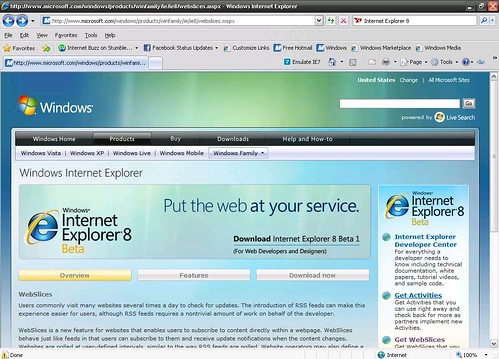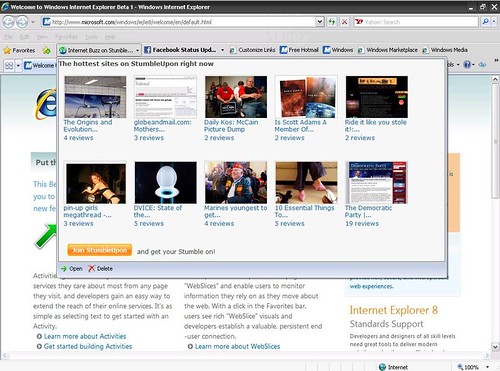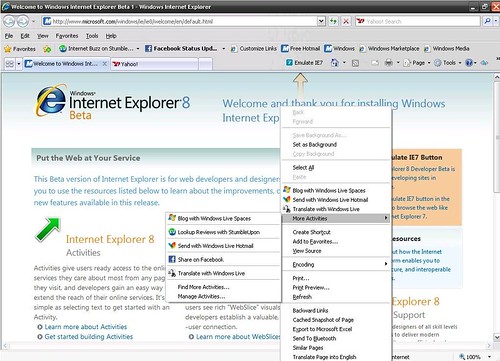The browser wars are here again. With Firefox 3 just around the corner, Flock rolling out version 1.2 just weeks ago, Opera letting the world know 9.5 is "coming soon" and Safari...well, let's just say they are "in the running"; Microsoft's announcement earlier this week that Internet Explorer 8 beta 2 will come in August seems to indicate that the time has come yet again for the browser wars to ignite again. This time though, the audience has changed and the focus along with it.
In the last round, security issues took centre-stage and underdog Firefox scored big against Microsoft's Internet Explorer thanks to this.
This round, we're looking at kids who've grown up on the internet, are immersed in the new-fangled web 2.0 world and want, above anything, a powerful browser that puts all their favourite social networking tools at their fingertips.
Witness Flock, social web browser extraodinaire, whose key selling point is the built-in interfaces it has for social networks like Facebook, Flickr, Blogger, Twitter, MySpace etc. Undoubtedly, Flock should be the winner, right? Err... no, not in my opinion. My brief test of Flock quickly showed me how having too many features and too much integration can be problematic in itself - the direct result being a cluttered interface.
So when I heard of the Microsoft announcement, I thought to myself "it's probably time to check out what the folks at MS have up their collective sleeves." And off I went to download my copy of Internet Explorer 8 beta 1.
Thoughts on IE8
Internet Explorer 8 beta 1 comes with two shiny new toys that more tightly integrate Web 2.0 activities into the browser. The first of these, which I happen to like very much is Web Slices. Essentially, a Web Slice is like a graphically enhanced RSS feed, or a frequently updated portion of a page, cleverly coded, so you can preview that portion of that page without actually surfing to said page.
So, for example, the above picture shows a small 'slice' of the StumbleUpon homepage (the 'internet buzz' section) without having you to surf over to StumbleUpon to check out what has recently been 'stumbled'. Quite intuitive. You could also cut a 'slice' of your Facebook homepage and have it update you on your friends' latest updates.
The second key feature is what Microsoft calls Activities. What it really means is "stuff you can do from the right click menu." Okay, so actually this feature isn't really new and you can already do many things off a right-click with the appropriate plugins in FireFox and / or Flock. And to be honest, most of the couple of Activites in Microsoft's current line-up are just boring stuff tied to their services which no one uses (Blog on Spaces anyone?) There are useful ones, like "Share link via Facebook", which lets you instantly share the page you're on by posting it up on your Facebook page.
But still, I applaud the inclusion of functionality like Activities into Internet Explorer 8 simply because it validates the shifting of the web towards iteration 2.0. It validates what all of Microsoft's competitors have been doing. Who are we kidding? Internet Explorer will probably still be the web browser the majority of people will use because it's the one they find installed on their PCs. And by integrating Web 2.0 functionality into IE8, soon web-behaviour will shift towards the Web 2.0 dream the geeks and geekettes have been having.
Future of the browser
It's clear that the new frontier for war on the browser front will be waged on how well web-browsers can integrate Web 2.0 functionality. Each combatant manages this differently. Firefox gives you very base functionality, but has a fantastic plug-in system that let's you customise almost indefiitely. IE8's slices and activities show's some innovative thinking from the software giant. Flock tells me too much of a good thing can be bad.
What people will soon have to consider though is how much more heavy these browsers will be thanks to this new functionalities. I've heard horror stories of FireFox 3, and even the latest release candidate 2 is considered bloatware by many. To the uninitiated, this simply means that your computer slows down every time you open up an internet browser. The more it slows down, the "heavier" your browser is.
Secondly, most of these "social" browsers will collect private and personal information about you and insist that it's stored on your computer. Of course, you have the option of keying in all the passwords to your GMail, Twitter, Facebook, MySpace, Blogger, Del.icio.us, StumbleUpon, MSNLive, and Yahoo! accounts again if you like. But I suspect not very many people would. The danger in this is obvious, as we pander for the convenience having a socially-integrated web browser brings, we put ourselves at the risk of having much of our security information stolen. Sure, it's already happening now with saved passwords and cookies, but imagine a single browser piecing together your multiple identities on the web and then having all that data stolen? Even more dangerous, how about passing your laptop to a colleague to use and when he / she pops open the browser, he / she gets greeted by some very private Facebook messages?
Thirdly, with the rise of mobile devices, more and more emphasis will be placed on the "content" of the site and not the webpage itself. Sure, the browser will be relevant for a long time coming, but what about those mobile devices that basically let you browse what you want on the web without having to actually browse? For example, my client Nokia, has been developing some pretty cool S60 apps like Share Online which allows you to check out and comment on your own or your contacts Flickr photos without actually logging onto Flickr through a browser. Or Twibble, which I use as my main means of staying connected to Twitter without actually browsing over to Twitter. In fact, a lot of the integration of Web 2.0 functionality straight into the browser actually helps you get around actually "browsing" the page.
Just some thoughts to think about as we move into the next wave of Internetting. :)
Friday, June 6, 2008
Internet Explorer 8 and thoughts on web browsers
Subscribe to:
Post Comments (Atom)

2 comments:
Great entry. :)
@jen: Thanks!
Post a Comment